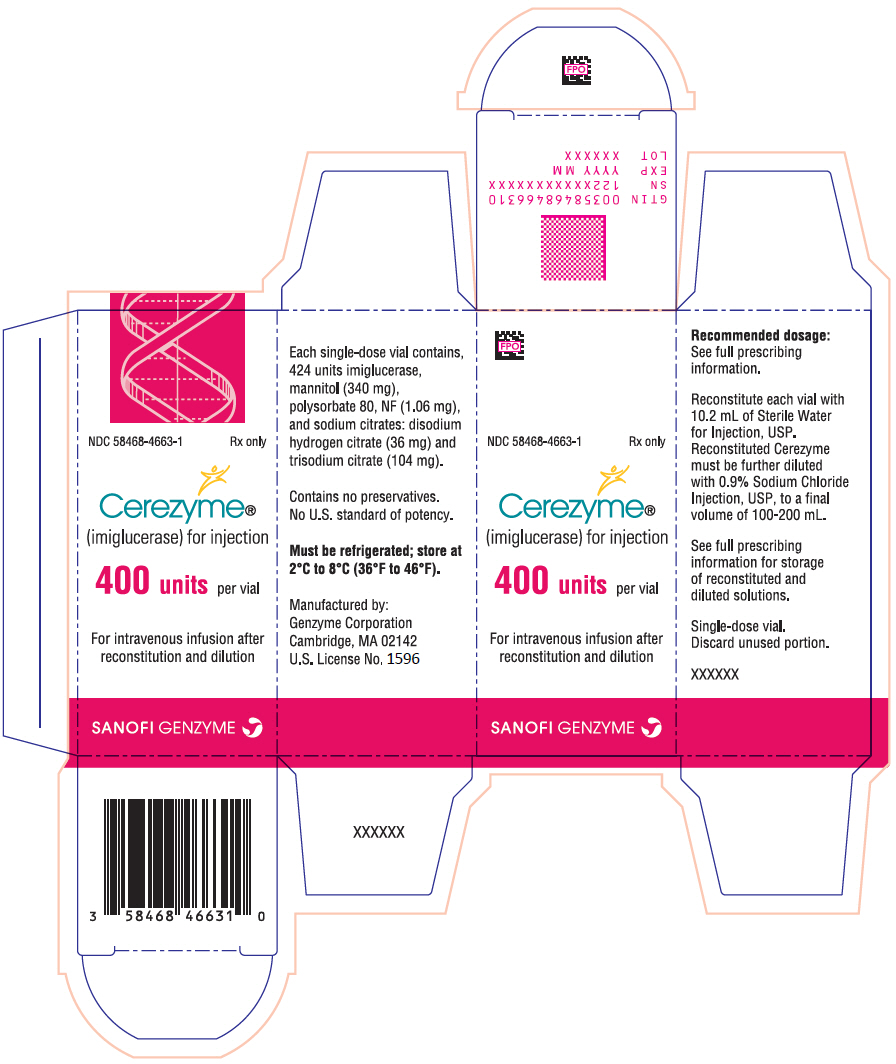Cerezyme
Generic name: imiglucerase
Drug class: Lysosomal enzymes
Medically reviewed by A Ras MD.
What is Cerezyme?
Cerezyme is a prescription medicine that is used to treat Gaucher’s disease.
Description
Imiglucerase is a hydrolytic lysosomal glucocerebrosidase-specific enzyme. It is an analogue of the human enzyme b-glucocerebrosidase (b-D-glucosyl-N-acylsphingosine glucohydrolase, E.C. 3.2.1.45), produced by recombinant DNA technology using mammalian cell culture (Chinese hamster ovary). Purified imiglucerase is a monomeric glycoprotein of 497 amino acids, containing 4 N-linked glycosylation sites (Mr=60,430). Imiglucerase differs from placental glucocerebrosidase by one amino acid at position 495, where histidine is substituted for arginine. The oligosaccharide chains at the glycosylation sites have been modified to terminate in mannose sugars. The modified carbohydrate structures on imiglucerase are somewhat different from those on placental glucocerebrosidase.
Cerezyme (imiglucerase) for injection is intended for intravenous use. It is supplied as a sterile, nonpyrogenic, white to off-white lyophilized powder for reconstitution with Sterile Water for Injection, USP. Each single-dose vial contains 424 units imiglucerase, mannitol (340 mg), polysorbate 80, NF (1.06 mg), and sodium citrates: disodium hydrogen citrate (36 mg) and trisodium citrate (104 mg).
An enzyme unit (U) is defined as the amount of enzyme that catalyzes the hydrolysis of 1 micromole of the synthetic substrate para-nitrophenyl-b-D-glucopyranoside (pNP-Glc) per minute at 37°C. Reconstituted solutions have a pH of approximately 6.1.
Mechanism of Action
Gaucher disease is characterized by a deficiency of β-glucocerebrosidase activity, which results in accumulation of glucocerebroside in various tissues including liver, spleen, and bone marrow. The mannose sugars on imiglucerase mediate binding to and internalization by cells including macrophages. Cerezyme catalyzes the hydrolysis of glucocerebroside to glucose and ceramide.
Before taking Cerezyme, tell your doctor:
- If you are allergic to Cerezyme; any part of this medicine; or any other drugs, foods, or substances. Tell your doctor about the allergy and what signs you had.
This medicine may interact with other drugs or health problems.
Tell your doctor and pharmacist about all of your drugs (prescription or OTC, natural products, vitamins) and health problems. You must check to make sure that it is safe for you to take Cerezyme with all of your drugs and health problems. Do not start, stop, or change the dose of any drug without checking with your doctor.
What are some things I need to know or do while I take Cerezyme?
- Tell all of your health care providers that you take Cerezyme. This includes your doctors, nurses, pharmacists, and dentists.
- Have blood work checked as you have been told by the doctor. Talk with the doctor.
- Allergic effects that may or may not be unsafe may happen during and after the infusion. Talk with the doctor.
- Other drugs may be given before Cerezyme to help avoid side effects.
- Tell your doctor if you are pregnant or plan on getting pregnant. You will need to talk about the benefits and risks of using Cerezyme while you are pregnant.
- Tell your doctor if you are breast-feeding. You will need to talk about any risks to your baby.
How is Cerezyme best taken?
Use Cerezyme as ordered by your doctor. Read all information given to you. Follow all instructions closely.
- It is given as an infusion into a vein over a period of time.
What do I do if I miss a dose?
- Call your doctor to find out what to do.
What are the side effects of Cerezyme that I need to call my doctor about immediately?
WARNING/CAUTION: Even though it may be rare, some people may have very bad and sometimes deadly side effects when taking a drug. Tell your doctor or get medical help right away if you have any of the following signs or symptoms that may be related to a very bad side effect:
- Signs of an allergic reaction, like rash; hives; itching; red, swollen, blistered, or peeling skin with or without fever; wheezing; tightness in the chest or throat; trouble breathing, swallowing, or talking; unusual hoarseness; or swelling of the mouth, face, lips, tongue, or throat.
- Trouble breathing that is new or worse.
- Chest pain or pressure or a fast heartbeat.
- Shortness of breath, a big weight gain, or swelling in the arms or legs.
- Flushing.
- Cough.
- Very bad dizziness or passing out.
- Change in color of skin to a bluish color like on the lips, nail beds, fingers, or toes.
- Fever or chills.
What are some other side effects of Cerezyme?
All drugs may cause side effects. However, many people have no side effects or only have minor side effects. Call your doctor or get medical help if any of these side effects or any other side effects bother you or do not go away:
- Upset stomach or throwing up.
- Belly pain.
- Diarrhea.
- Feeling tired or weak.
- Headache.
- Dizziness.
- Back pain.
These are not all of the side effects that may occur. If you have questions about side effects, call your doctor. Call your doctor for medical advice about side effects.
You may report side effects to the FDA at 1-800-332-1088. You may also report side effects at https://www.fda.gov/medwatch.
If overdose is suspected:
If you think there has been an overdose, call your poison control center or get medical care right away. Be ready to tell or show what was taken, how much, and when it happened.
How do I store and/or throw out Cerezyme?
- If you need to store Cerezyme at home, talk with your doctor, nurse, or pharmacist about how to store it.
Label
PRINCIPAL DISPLAY PANEL – 400 UNIT VIAL CARTON
- NDC 58468-4663-1
Rx only - Cerezyme ®
(imiglucerase) for injection - 400 units per vial
- For intravenous infusion after
reconstitution and dilution - SANOFI GENZYME

SRC: NLM .
